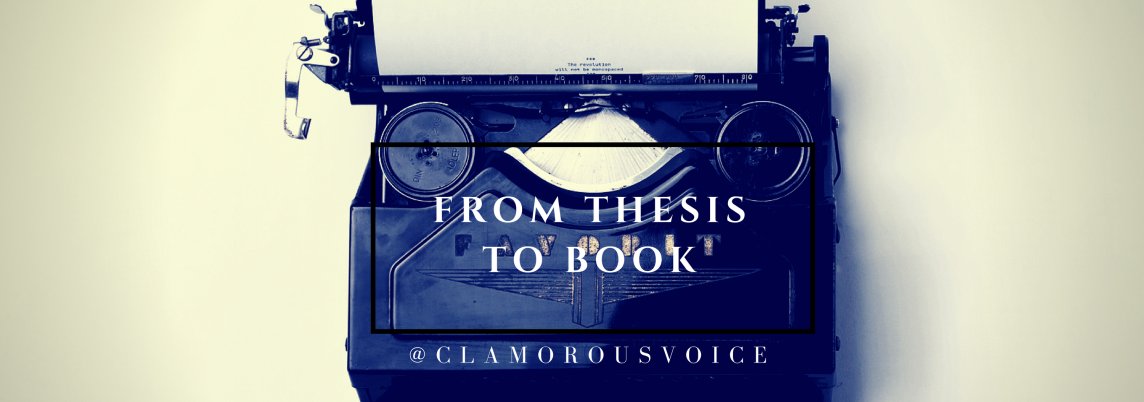
Shakespeare’s Women and the Fin de Siècle is out in UK hardback from OUP on 1st December! I thought I’d share what I’ve learned from the process of revising your thesis into a book. If the title seems like clickbait, it’s certainly v. niche.
Some of what follows is general, some deliriously specific. But here’s What I Have Learned…
- In the beginning, you feel embarrassed
Returning to your thesis after a pause will reunite you with a species of embarrassment you haven’t known since reviewing your UCAS statement. Dear lord, weren’t you lofty in your disagreements with critics? Why have you never learned to spell ‘negotiate’? And, as your supervisor so frequently asked you, did you think you were being paid by the semicolon? Also, ctrl+find on the phrase ‘this thesis’. Rinse and repeat.
- Bad proposals sink good books
I’m lucky: OUP read your thesis alongside your proposal for the Oxford English Monographs list. My readers liked the thesis and hated what I’d said about it. Despite good advice and money spent on A Well-Known Book On The Subject, I’d made a mess of the proposal. Unsure what needed changing, and teaching full-time, I offered to butcher my dissertation, double-quick. I could as usefully have written “please publish me?” on a post-it. On my forehead. My editor and supervisors helped me parse the reports, which became my most-studied documents through the rewriting process. I wrote in response to their reports, they replied, and it became clear that they were very enthusiastic about the material and had offered me a far clearer path to revisions than I’d expected. I can’t believe how much trouble everyone took.
I’ve since gone through the proposal process far more successfully, and would advise:
- Don’t claim you can rewrite the book too quickly. Ask your proposed editor/whoever is working with you at this stage (if there isn’t someone, ask for them – if you’re still in a university faculty, is there a Research or Publishing Facilitator who would help?) for a sensible timeline. Ask your supervisors too.
- Tailor your proposal exactly to your publisher’s requirements. If your publisher gives minimal guidelines, look at other publishers’ websites to see what tips they give.
- Write the proposal engagingly. If your 2,000 words are boring, your 80,000 words are likely to be more so.
- ASK TO READ OTHER PEOPLE’S PROPOSALS. I have no idea why I didn’t do this. Pride? Fear? Stupidity. I have a bad proposal (Book 1) and a good proposal (Book 2) on my hard drive & they’ve circulated more times than a Mudie’s mystery novel (it’s that kind of 1895 wit that’s got me where I am today. As Ed Balls would say, BOOM).
- You don’t have to negotiate like a first-time author
Possibly you’re a lofty, confident, professionalised young ECR with a hard head, a ten-year plan and convictions about this monograph’s worth. Or possibly you are deeply relieved and grateful that your Publisher Of Dreams wants your book in the first place. I was the latter. On two separate occasions, there was something about the contract/process which I wanted to alter. I felt that raising the matter would make me seem uppity/entitled/would jeopardise the publishing process. I nervously constructed an email, then ripped out all the feminine apologetics (like any good Springboard graduate).
It was totally fine. Unwanted contractual detail expunged by return of post. Just do it: a) even if the answer’s no, nobody will mind you starting the debate, and b) for all you know, 9 out of 10 (straight white male) first-time authors historically make – and are granted – the same request.
- Thrills abound.
You know the contract will be exciting (FYI, so will saying ‘I’m under contract’ as if it’s with Warner Bros but you’re breezily calm). You’ve been planning your acknowledgments (monograph answer to an Oscar speech) and you’ve probably had some thoughts about the cover art. But there’s more. Your Amazon page! Your publisher page! The first time your book appears in a catalogue, convincing you – with a touching, residual faith in print – that your book will soon be real. All these are marvellous. Treasure them.
- You can get a contract for your second book before the first is published.
Again, this might have been obvious to lofty, hard-headed ECRs with a ten-year p. and a conviction about their scholarship’s w. (see above) but it was not obvious to self. Nevertheless, several things fell into place: having always been crap at condensing my doctorate into two sentences, I was determined to be able to pitch my second book. I honestly went along to the Routledge editorial speed-dating event to practice pitching. I’d assumed that nobody would take my second book seriously until the first one was a physical object. Stupidity, again. You know what’s great? Signing your first book contract (I instagrammed mine). You know what’s amazing? Signing your second. You feel like JK Rowling. And, yet:
- It might be bittersweet.
I have always dreamed of writing a novel. In my head, my first book was going to involve literary prizes and film rights, and although I suppose there is a chance that Shakespeare’s Women and the Fin de Siècle MIGHT turn into a six-part BBC series starring Hattie Morahan as Ellen Terry, Keeley Hawes as Madge Kendal, and Michelle Dockery as Mrs Patrick Campbell (PLEASE NOTE: this would be the greatest BBC series of all time, I’ve done the work for you, we just need to find a Lillie Langtry as beautiful as Francesca Annis was in 1978), I have resigned myself to the truth. For the moment, I am very much of those academics with 1,000 novel ideas in their (twenty-first-century-Cloud-equivalent-of-) bottom drawer. I hope to one day graduate to being one of those academics with one novel idea realised on a Waterstones shelf.
- You will become obsessed with your readers’ identity.
The slightest expression of interest from a fellow conference-goer will seem like a veiled confession. I know one of my readers, because they introduced themselves to me. I was so delighted that I hugged them rapturously, and now beam like a fool whenever they’re mentioned in conversation. Rightly, much light is now being shone on the unpaid murkiness that dominates work for many ECRs – in the name of experience, our industry is building up an ‘internship culture’ to match any other sector, even if the reality is ‘can’t pay’ rather than ‘won’t’. But academic service makes heavy demands of scholars further along the line. I think anyone who reviews a book/thesis MS lucidly and generously (like my readers) is brilliant. Everything I’ve written in the book (and everything I’m writing in the next one) is better because of them.
- You will be obsessed with the last people to publish on your list.
How did they do the index? What’s the font like? Why is their name italicised on the cover? Which colour did they choose? Their index sub-headings don’t seem to be indented, why are their acknowledgments so well-written, gosh they’ve got an actual Amazon! Look Inside link, ugh their 3 to 5 marketing bulletpoints don’t sound like they were written in terror —
- You never really finish proofreading.
The only good things about reading your own proofs are 1) the talented patience of your professional proofreader, and 2) when you open the PDF and see your manuscript laid out like a proper book. Otherwise, the defining feature of Looking For Errors is that of stargazing or finding ants on the kitchen floor: every time you find one, you see six in its immediate vicinity. I am just about convinced, now, that there won’t be ten blank pages, five historical howlers, and three instances of ‘[EXPLAIN MORE HERE]’ in the published version. This will be entirely due to the professionals and not to my own checking. If you do find a blank page or historical howler etc., feel free not to tell me.
- Indexing is like having your brain removed by tweezers.
I had always vaguely planned to pay someone to do my indexing, but then two world-rocking things happened. 1) My colleague described to me, over lunch, how rigorously she’d compiled her own index, explaining eloquently how authorial knowledge of the manuscript was essential for an index that reflected and enhanced the text. I listened, reflected on all the crap indexes I’d encountered during my own DPhil, and light-up hipster letters flashed in my brain: SHE DID HER OWN INDEX. And, a nanosecond later, SHE IS A PROPER ACADEMIC. God damn those colleagues, modelling excellent scholarship at every turn. And then, 2) I found out how much paying an indexer would actually cost. I did my own bloody index. It was like proofreading my own psyche, one hideous preoccupation at a time. A mini-tip: index everything from page 1 onwards, because something you think wasn’t important at all will turn out to have occurred 50 times between pages 150-200 and you’ll be thinking nauseously of all those earlier references you overlooked. That sentence might not mean anything now, but it will. In the process, you’ll come to wonder why other people’s indexes have entries like ‘Regatta, Henley’ and yours has ‘rape, marital’. You’ll go from resenting how much professional indexers are paid to thinking it’s not enough. Also, you probably don’t have long to index, so don’t waste time on learning indexing software. You can’t afford it.
- You’ll remember how much you loved your doctorate.
And you can even sneak in some more research. I wallowed in ‘necessary’ extra visits to my favourite archives and read every scrap of writing from Henry Irving to Ellen Terry. This is my idea of a very good time. I revised my thesis into a book alongside the start of my postdoctoral project, and alongside the challenge of a new and less familiar subfield, returning to actresses, suffragettes, and Shakespeare was bliss.
- Supportive friends and family will plan to buy the book.
Then you’ll have to tell them how much it’ll cost.
- It takes a village.
Not a village. An extremely conscientious publishing company and its team across three continents. I am still floored by this. My editor is based in Oxford; my marketing contact is in New York; my production coordinator is in India, and my copyeditor lives in Lancaster! My proofreader is the only enigma. From her name, I imagine her as a 1950s bluestocking with a recent history in espionage.
I could link you to a million articles bemoaning the downturn, high cost, and jeopardised future of academic publishing. I’d rather tell you how great my team has been. I feel lucky to have had amazing women all around the world work on my book; appropriate for a book that’s about cooperation and mentoring between creative women (it’s also about Jack the Ripper, but that’s a less seamless segue).
What did you learn, or what are you learning, through writing your first book?

Enjoyed reading this post – even as someone not planning on turning s thesis to a book! Can’t believe you did your own indexing (or indeed that the publisher doesn’t pay). I obviously have paid people to index with company funds in previous publishing life. It always seemed like not enough – what a job (on one occasion the indexer had indexed people by first name not surname – why???? – and I had to fix it. That was bad enough) . But I agree it’s got to be better for being done by someone who knows the text.
Also – congrats on second book and imminent arrival of the first in print!
LikeLiked by 1 person